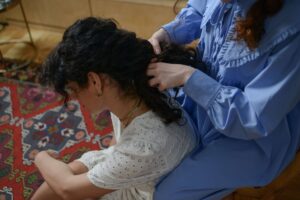Braids, Buns, and Beyond

In the world of beauty and hair care, the quest for healthy, luscious locks is a journey embraced by many. Enter the realm of protective hairstyles – not only a trendy fashion statement but a powerful strategy for nurturing and safeguarding your precious tresses. In this beauty blog, we will explore the art of mastering protective hairstyles and how they contribute to the overall health and vitality of your hair.
Protective hairstyles are not just about creating stunning looks; they serve a dual purpose by shielding your hair from environmental stressors and minimizing damage. These styles involve tucking away the ends of your hair, reducing exposure to factors that can lead to breakage, split ends, and overall hair damage.
The Benefits of Protective Hairstyles
- Minimized Breakage:
One of the primary advantages of protective hairstyles is the reduction in hair breakage. By securing the ends of your hair, these styles prevent friction and rubbing against clothing, pillowcases, or other surfaces that could lead to breakage.
- Retained Moisture:
Protective styles help lock in moisture, preventing your hair from drying out. This is especially beneficial for individuals with naturally curly or textured hair, as retaining moisture is crucial for maintaining elasticity and preventing frizz.
- Reduced Split Ends:
Split ends are a common concern for those seeking long, healthy hair. Protective hairstyles keep the ends of your hair tucked away, minimizing exposure to external elements that contribute to split ends.
- Low Maintenance:
Many protective styles are low-maintenance, allowing you to give your hair a break from daily styling and manipulation. This break can contribute to overall hair health and reduce the risk of overprocessing.
- Length Retention:
For individuals focused on growing their hair, protective hairstyles aid in length retention. By minimizing breakage and creating a conducive environment for healthy hair growth, these styles support your journey to longer locks.
Popular Protective Hairstyles to Master
- Braids:
Braiding is a versatile and timeless protective hairstyle. Whether you opt for classic three-strand braids, box braids, or cornrows, braided styles offer a range of options to suit your preferences and hair type.
- Twists:
Similar to braids, twists are a fantastic protective option. Two-strand twists or flat twists can be customized to achieve different textures and looks, providing flexibility for various occasions.
- Buns and Updos:
Elegant buns and updos are not only stylish but also effective in protecting your hair. By securing your hair in a bun or updo, you minimize exposure to the elements and reduce the risk of tangling and breakage.
- Wigs and Weaves:
Wigs and weaves offer a protective layer over your natural hair, allowing it to rest and grow without being subjected to daily styling. High-quality wigs and weaves can be styled to suit your desired look.
- Crochet Braids:
Crochet braids involve attaching extensions to your natural hair using a crochet needle. This technique offers a protective styling option that is quick to install and comes in various textures and lengths.
- Halo Braids:
Halo braids, also known as crown braids, encircle the head like a halo. This style not only protects your hair but also creates a stunning and regal appearance.
Tips for Mastering Protective Hairstyles
- Start with Healthy Hair:
Before diving into protective styles, ensure your hair is well-moisturized and free from damage. Trimming split ends and addressing any existing issues sets the stage for a successful protective styling journey.
- Moisturize and Seal:
Even in protective styles, maintaining moisture is crucial. Use a leave-in conditioner or a moisturizing spray to keep your hair hydrated, and seal in the moisture with natural oils such as coconut or jojoba oil.
- Gentle Installation:
Whether braiding, twisting, or installing extensions, prioritize gentle techniques to avoid unnecessary tension on your hair. Excessive pulling and tight styles can lead to breakage and scalp discomfort.
- Nighttime Routine:
Protect your protective style at night by wrapping your hair in a satin or silk scarf. Alternatively, use a satin or silk pillowcase to minimize friction and maintain the integrity of your hairstyle.
- Regular Maintenance:
While protective styles are designed to minimize manipulation, regular maintenance is still essential. Cleanse your scalp, moisturize your hair, and address any issues promptly to ensure optimal hair health.
- Avoid Prolonged Wear:
While protective styles are beneficial, avoiding prolonged wear is crucial. Extended periods without allowing your hair to breathe and receive proper care can lead to issues such as product buildup and potential damage.

Embracing the Protective Style Lifestyle
Mastering protective hairstyles is not just a one-time endeavor; it’s a lifestyle that requires commitment and care. By incorporating these styles into your routine and understanding their benefits, you not only achieve stunning looks but also nurture the health and vitality of your tresses. So, whether you’re opting for intricate braids, elegant updos, or the simplicity of twists, embark on your protective styling journey and let your hair flourish with health and beauty.

